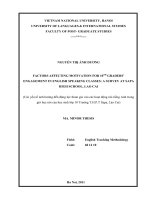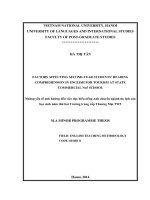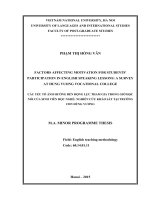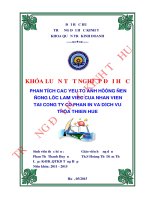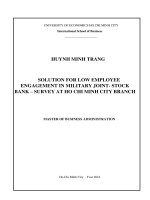Factors affecting motivation for 10th graders' engagement in English speaking classes A survey at SaPa high school, Lao Cai ảnh hưởng đến động lực tham gia vào
Bạn đang xem bản rút gọn của tài liệu. Xem và tải ngay bản đầy đủ của tài liệu tại đây (1.01 MB, 17 trang )
VIETNAM NATIONAL UNIVERSITY, HANOI
UNIVERSITY OF LANGUAGES & INTERNATIONAL STUDIES
FACULTY OF POST- GRADUATE STUDIES
***
NGUYỄN THỊ ÁNH DƯƠNG
FACTORS AFFECTING MOTIVATION FOR 10
TH
GRADERS’
ENGAGEMENT IN ENGLISH SPEAKING CLASSES: A SURVEY AT SAPA
HIGH SCHOOL, LAO CAI
(Các yếu tố ảnh hưởng đến động lực tham gia vào các hoạt động nói tiếng Anh trong
giờ học nói của học sinh lớp 10 Trường T.H.P.T Sapa, Lào Cai)
MA. MINOR THESIS
Field: English Teaching Methodology
Code: 60 14 10
Ha Noi, 2011
Abstract
iii
Abstract
With an investigation into the reality of teaching and learning English speaking at SPHS,
and an examination of the factors affecting motivation for 10 Graders’ engagement in
English speaking classes (ESC), this research is aimed at (1) investigating types of
motivation possessed by grade 10 students at SPHS, (2) finding out some factors affecting
motivation for students’ engagement in ESC, (3) exploring teachers’ and students’ attitudes
towards speaking skill and speaing activities in ESC, (4) surveying the activities and
techniques applied by teachers and students’ preferences at this school and recommending
some strategies for teachers and students to enhance grade 10 students of engagement in
ESC. The research data collection instruments are questionnaire, interview and classroom
observation. The result taken from the questionnaire, interview and observation reveals that
the majority of students possess instrumental and extrinsic motivation, some of them
integrately and intrinsically learn it, resultative motivation ranks the smallest number of
participants. It also indicates that the factors affecting motivation and demotivation come
from students, teachers and classroom learning environment. The activities and techniques
teachers apply have the great influence on students’ engagement. Basing on the findings of
the research, the study suggested some recommendations for both teachers and students to
improve the teaching and learning speaking in the school.
Table of Contents
iv
Table of Contents
CANDIDATE’S STATEMENT i
ACKNOWLEDGEMENTS ii
ABSTRACT iii
TABLE OF CONTENTS iv
LIST OF TABLES vii
LIST OF FIGURES viii
LIST OF ABBREVIATIONS AND CONVENTIONS ix
PART 1: INTRODUCTION ix
1. Rationale for the study 1
2. Aims of the study 2
3. Methods of the study 2
4. Scope of the study 3
5. Organization of the study 3
PART 2: DEVELOPMENT 4
CHAPTER ONE: LITERATURE REVIEW 4
1. An overview of speaking in L2 learning 4
1.1. Definition of speaking 4
1.2. Approaches to the teaching of speaking 4
The Grammar translation Method (GTM) 4
The Direct Method (DM) and Audiolingualism 5
Communicative Language Teaching 5
1.3. The roles of the teacher in different stages of teaching speaking 5
1.4. Motivation in speaking in classroom 6
1.4.1. Motivation 6
1.4.2. Motivation in the classroom setting 7
1.4.3. Factors affecting students unwilling to speak in classroom 8
1.4.4. Some conditions for effective motivation in speaking 8
1.4.5. Motivational macrostrategies 8
2. Concept of students’ engagement and factors affecting motivation for students’
engagement 9
2.1. Concept of students’ engagement 9
2.2. Factors affecting students’ engagement 10
2.2.1. Students’ learning styles 10
2.2.2. Students’ motivations 11
2.2.3. Teacher’s teaching techniques 11
Table of Contents
v
2.2.4. Teachers’ personal qualities and characteristics 11
2.2.5. Effective classroom learning environment 13
CHAPTER TWO: METHODOLOGY 15
1. Research setting 15
1.1. An overview of the research site 15
1.2. Description of the teachers of English and students 15
1.3. The materials of teaching and learning 16
2. Participants 17
2.1. Population 17
2.2. Sampling 17
3.3. Detailed description of participants 17
3.4. Data collection instruments 17
3.4.1. Questionnaires 18
3.4.2. Interviews 18
3.4.3. Classroom observations 19
3.5. Data Collection Procedures 19
CHAPTER THREE 20
DATA ANALYSIS, DISCUSSION OF MAJOR FINDINGS AND
RECOMMENDATIONS 20
1. Data analysis 20
1.1. Data analysis from Students’ Questionnaire 20
1.1.1. Students’ motivation in engaging in ESC 20
1.1.2. Factors affecting motivation for students’ engagement in ESC and students’
attitude towards activities and techniques applied by teachers 24
1.2. Data analysis from Teachers’ Questionnaire 27
2. Major findings and discussions 31
2.1. Research question 1 31
2.2. Research question 2 31
2.3. Research question 3 33
2.4. Research question 4 34
3. Recommendations for motivating students to engage better in ESC 34
3.1. Recommendations for teachers 34
3.1.1. Promoting students’ internal factors 35
3.1.2. Building effective classroom learning environment 36
3.1.3. Varying speaking activities 37
3.1.4. Managing speaking turns in class 37
3.1.5. Combining the textbook and relevant materials and recognize the potential
value of available facilities of the school and the Internet 38
3.1.6. Being enthusiastic, tolerant, helpful, friendly, creative and active 38
Table of Contents
vi
3.2. Recommendations for the students 39
3.2.1. Cooperating with their teachers 39
3.2.2. Taking risks 39
PART 3: CONCLUSIONS 40
1. Conclusions 40
2. Limitations and suggestions for further study 41
REFERENCES 42
APPENDIX 1 I
APPENDIX 2 IV
APPENDIX 3 XIII
APPENDIX 4 XVII
APPENDIX 5 XIX
1
1
INTRODUCTION
1. Rationale for the study
The ever-growing need for good communication skills in English has created a huge
demand for English teaching around the world. In Vietnam, the importance of English as a
language of international communication has been acknowledged by the Government and it
is considered as a compulsory subject in the school curriculum.
Motivation plays an important role in the success of language learners in learning a foreign
language in general and learning foregn language skills in particular. Learning speaking
skill is not an exception.
The teachers at SPHS meet many difficulties in motivating students get involve better in
ESC because students in Sa Pa (SP) come from a variety of socio-economic groups and they
are multicultural as well as multi-level. Moreover, there are many factors affecting
motivation for students’ engagement in ESC.
This is the reason why I choose studying on factors affecting motivation for 10th graders’
engagement in ESC is the topic for my thesis.
2. Aims and research questions of the study
The study aims at exploring the factors affecting motivation for 10th graders’ engagement in
ESC at SPHS, Lao Cai (LC). The objectives of the research are as follows:
To examine the types of motivation possessed by grade 10 students at Sapa high
school in engaging in English speaking classes.
To exploring the factors influencing the students’ motivation in engaging in English
speaking classes.
To examine teachers and students’ attitudes towards speaking skill and speaking
activities in ESC.
To determine effective techniques to enhance the students’ motivation in engaging in
English speaking classes
To achieve these aim and objectives, the study sets out to answer the following research
questions:
(1). What are the types of motivation possessed by grade 10 students at Sapa high
school in engaging in English speaking classes?
(2). What are factors influencing the students’ motivation in engaging in English
speaking classes?
(3). What are teachers and students’ attitudes towards speaking skill and speaking
activities in ESC?
2
2
(4). What techniques could be applicable to enhance the students’ motivation in
engaging in English speaking classes?
3. Methods of the study
The study employed survey research. In my study, data were collected via questionnaires,
interviews and classrooms observation in order to increase the credibility of the findings: (1)
Giving questionnaires for both teachers and students; (2) Interviewing students; (3)
Oserving classroom to get information about both teachers’ approach of teaching and
students’ habit of learning in class as well as ascertain the prevalent problems forwarded by
the students and teachers during the interview and questionnaire.
4. Scope of the study
There exist a variety factors affecting motivation for 10th graders’ engagement in English
speaking classes. However, it is not my intention to cover all of them because of the time
and length constraint of the study, I only focus on the factors come from learners, teachers
and classroom learning environment. In this study, students’ engagement happened only in
speaking activities in ESC.
METHODOLOGY
1. Research setting
1.1. An overview of the research site
SP is one of the districts in a mountainous province of LC. There are many differences
between SP town and the villages. SP town is rich and exciting because of tourism; on the
other hand, the villages in SP where four minority ethnic groups Mong, Tay, Dao, Giay live
in are very poor. Therefore, students’ learning condition in SP is much different from each
other. SPHS is located in the centre of SP town. 60% of school students are minority ethnic
students. Despite the fact that LC province has achieved national standards in the
universalization of junior secondary education (Report by Lao Cai PPC, 2007), in some
remote areas, SP included, it is very hard to consult students to continue their study to high
school level. That is because of many reasons, such as: the poverty, traditional culture of
early marriage, the limited awareness of the benefit of having higher education in the
ethnics groups. For that reason, annually, there are not enough students to enrol in high
3
3
school level in SP. So it is difficult for us to hold placement test for students which leads to
multi-level students in the classes.
1.2. Description of the teachers of English and students
In SPHS, there are 5 teachers of English aged from 26 to 45. Their experience in teaching
English varies from 3 to 20 years. Most of them graduated from Foreign Language
Teachers’ Training Universities. These teachers are qualified for the job. SPHS has two
teachers of English who are key teachers of LC province. They both have rich teaching
experience and subject matter knowledge. They had been teaching English for more than ten
years in high school. Generally, all of the teachers of English in this school love teaching
and have positive attitudes to supporting their students’ learning.
Students in SPHS come from a variety of socio-economic groups. Students come from SP
town have better learning condition outside classroom. Many of them are able students and
have had quite good results during their secondary education. Some of them have a lot of
chance to practise speaking English with native speakers so their speaking skill is quite
good. On the contrary, students coming from ethnic minority groups live very far from the
centre of the town and their families’ income comes from farming which is considered one
of the lowest income groups in Vietnam. They have their own traditional culture and
languages and their mother languages are not Vietnamese. They finished secondary
education in local secondary schools in their villages which have poor learning condition so
they have had not very good results in secondary school education. Although the local
government has priority policies to provide education for these groups and encourages
students to go to school as offered ethnic students free accommodations in the school’s
hostel and free food, those students need extra help from teachers after school time in order
to improve their quality of work.
1.3. The materials of teaching and learning
The textbooks currently used to teach English are English 10, English 11 and English 12
published by Ministry of Education and Training. I would like to focus on English 10 in my
thesis. The teaching content of English 10 textbook follows the theme-based approach and
is developed on six broad themes which are subdivided into 16 topics corresponding to 16
units and a “Test yourself” after every 3 units. All units have the same structure, starting
4
4
with the theme of the unit, followed by four lessons focused on language skills and ending
with language focus. Language skills are developed in parallel with the development of such
language knowledge as grammar, vocabulary, pronunciation.
With strengths, the textbook is expected to contribute better quality of English learning in
Vietnam high school. In terms of curriculum development, the introduction of the new
textbook can be new fresh air blowing into the teaching and learning situation at secondary
schools in Vietnam. However, to a large number of ethnic minority students, the new
English textbook set as well as English 10 are very difficult. Very often the amount of new
vocabulary in one unit was too much for students. In addition, many topics in the English
textbooks were strange to their daily lives and background.
2. Participants
2.1. Population
The target population for this study comprises 5 teachers of English and 80 students of
tenth-grade at SPHS. The brief description of the teachers of English and students has been
mentioned in the earlier sections of this chapter.
2.2. Sampling
The researcher used convenience sampling in this study. The sampling plan proposed for the
current study was a two-stage stratified cluster design (Jacobs et al., 2003). The first stage
consisted of selecting high school, and the second stage consisted of a sample of teachers
and students for questionnaires and interviews, a sample of classrooms and English
speaking lessons from the tenth-grade classrooms for observation in the sample school.
After participant selections were made, appointments were made to arrange suitable times
for questionnaire, interview and observation lessons. Five teachers of English and all
students in the two tenth-grade classrooms at SPHS agreed to take part in the study.
3.3. Detailed description of participants
There are two groups of participants in this study. The first group involves five teachers of
English who are currently teaching English at SPHS. They were observed and given the
questionnaires by the researcher. They are all female and are ranging from 26 to 45 years
old. Their teaching experience at high schools varies from 5 to 23 years. The variety in the
participants’ age, qualification, and teaching experience is expected to provide reliability
5
5
and validity for the study. The second group deals with eighty students who come from two
classes (10A5 and 10A6) at SPHS. 43.75% of the students are Kinh people who live in SP
town, the others belong to ethnic minorities Mong, Tay, Dao, Giay (Mong: 20%, Tay:
18.75%, Dao: 15% and Giay: 2.5%) and they live in the villages of SP district. The
students’ living condition, their learning outside class conditions, their attitudes, motivation
for foreign language learning are not the same.
3.4. Data collection instruments
In order to get information, the main data collection instruments for this study were
questionnaires for students and teachers, interview students and classroom observations.
3.5. Data Collection Procedures
The questionnaires were delivered to students and teachers at the middle of the second term
to gather information of students’ motivation in engaging in ESC, students’ attitude towards
speaking activities in English 10 textbook, students’ attitude towards techniques and
activities applied by teachers and their preferences as well as gathering information about
teachers’ attitudes towards students’ motivation in participating in ESC and the effects of
the activities and techniques that they had applied.
The informal interviews took place in a face to face situation with the students during the
second term of the school year 2010-2011, and the interviews were taken note or tape-
recorded. The interviews helped the researcher to get the necessary information on the
factors affecting motivation for students’ engagement in ESC.
The observations were conducted in 10 English lessons at 10 graders of two selected
teachers at the second term of the school year. The observations strengthened the
information gathered in the questionnaires and in the interviews.
DATA ANALYSIS, DISCUSSION OF MAJOR FINDINGS AND
RECOMMENDATIONS
This chapter deals with the data results of the questionnaires, interviews and the information
obtained through observation process. Also, a discussion of major findings is presented
which functions as practical groundings for further recommendations to be drawn out. In
this chapter, answers to the four research questions as well as recommendations will be
given.
6
6
1. Data analysis
1.1. Data analysis from Students’ Questionnaire
The questionnaire for the students was designed with three main parts consisting of 22
questions. The researcher used the data collected in Part I to describe the participants in the
previous chapter. In this part, the reseacher only analyse 18 questions in part II and part III.
1.2. Data analysis from Teachers’ Questionnaire
The questionnaires for teachers consisting of 9 questions were delivered to 5 teachers.
2. Major findings and discussions
2.1. Research question 1
What are the types of motivation possessed by grade 10 students at Sapa High School in
engaging in English speaking classes?
It was undeniable that over half of the subjects were instrumentally motivated when they
learnt subject matter. The subjects with integrate and intrinsic orientation occupied nearly
one third of students. Besides, the smaller number of them extrinsically learnt it. Added to
that, some were found to possess a mixed type of motivation by the mixture of intrinsic,
instrumental and integrate orientationin learning speaking. Instrumentally motivation, thus,
was the most important in learning speaking English of Grade 10 students at SPHS, LC.
In short, students’ motivations play an important role in deciding the level of their
engagement in class activities. Students with high level of interest and need will actively
participate in class activities. On the other hand, the students think they “have to” learn
English because of compulsory curriculum imply a very low motivation among them
resulting in passive and reluctant engagement in class activities. This would appear to
suggest that as the students’ motivation is low, the job of motivating students in learning
English burdens the teachers, and requires teachers’ appropriate teaching techniques for
mixed-level classes.
2.2. Research question 2
What are factors influencing the students’ motivation in engaging in English speaking
classes?
7
7
The findings shows that some factors that affected students’ motivation in engaging in ESC
were learners’ factors, teachers’ factors, and effective classroom-learning environment.
Firstly, some factors coming from learners such as learners’ proficiency in English, their
interest, need, personalities and learning style in learning speaking were found out. In the
speaking lesson, the students with lower proficiency might feel intimidated by the more
advanced ones. These students, thus, were often afraid of making mistakes and losing face
in front of their teacher and classmates. As a result, they often felt reluctant to speak out in
class. Also from the findings, students’ interest and need played an important role in
students’ speaking motivation. Students with high interest always put the aims for learning
and always tried their best to achieve them. These students also have high motivation to
learn English in general and to engage more in ESC in particular. The next was students’
personalities. The reluctant speakers were students who always felt ashamed, hesitant and
not self-confident enough in front of the classmates and teachers. The final factor from
learners was learning style. The findings from researcher’s observation pointed out that the
speaking class with more reflective learners seemed be quieter and more boring than the one
with more impulsive ones. In addition, the analytical and authority-oriented learners have
many difficulties in active participation in ESC. They prefer listening to the teacher than
expressing themselves. Moreover, the assessment system, which focuses more on accuracy
than fluency, always reminds them of studying grammar items and vocabulary to pass the
examinations. This learning style in fact prevents students from being familiar with active
participation in class activities as well as opportunities to speak English in classroom.
The second factor referred to teachers, which consisted of teacher’s behaviors and their
relationship with students, their teaching methods. The findings pointed out the first and
foremost important factors from teachers were teachers’ teaching method and the learner-
centered teaching methods is the good one. Teachers, with learner-centered teaching method
would know how to keep students’ speaking, how to motivate students brainstorming and
how to give each student chances to participate in speaking tasks in order to make the lesson
more exciting. Speaking activities and techniques in each lesson, therefore, can always be
varied by teachers. They got students to work in pairs, groups or individually in all lessons.
In different tasks they used different activities and techniques such as question and answer
exchanges, discussion, interview They also combined the textbook with relevant
materials, gave suggested questions and feedback regularly to the students, created the co-
8
8
operative working. Visual aid and games were appropriately used to stimulate students and
reduce students’ stress in speaking. Besides, teacher’s behavior and the relationship between
teacher and students were very important. All students wanted that their teacher were
friendly, enthusiastic, tolerant and helpful. The way teachers behaved, thus, had a great
impact on students’ motivation.
Thirdly, effective classroom learning environment also takes an important place in creasing
motivation. The majority of the students enjoyed the co-operative and pleasant atmosphere
in class. A pleasant and supportive classroom atmosphere would create students’ motivation
and encourage their participation in speaking. On the contrary, a tense classroom climate
would increase students’ anxiety, shyness and unselfconfidence. As discussed in the
previous parts, teachers play a significant role in students’ academic achievement and are
central to the creation of the classroom climate.
Thus, the factors that influence students’ motivation in speaking include both internal and
external ones. The internal factors are derived from students themselves and the external
ones are come from teachers as well as classroom atmosphere.
2.3. Research question 3
What are teachers and students’ attitude towards speaking skill and speaking activities in
ESC?
The findings denoted that the majority of the teachers and students think that the speaking
skill in general is important and useful to students. Many of the students have high desire in
learning English and they are interested in participate in ESC. However, nearly half of the
students have normal or low desire and they are reluctant in participating in classroom
activities because of many reasons. With regard to the activities provided by teachers in
ESC, about half of the students have positive perfective but many of them state that those
activities are little interesting and not suitable for them. Most of the students enjoy working
in groups. In term of the speaking activities designed in English 10 textbook, about two
third of the students and teachers found out the topics for speaking were acceptable, some
felt interested in these topics and only the small number estimated the topics were bad.
When were asked about the order of the lessons, all of the teachers remarked it was quite
logical. Next, some of the surveyed teachers complaint that the speaking tasks were at times
monotonous and many students say they were too difficult or difficult. The illustration was
9
9
good. In general, the speaking activities in English 10 textbook have been suitable for
students and teachers so far except something should be changed in the tasks so that they
should be more suitable for the majority of students’ level.
2.4. Research question 4
What techniques could be applicable to enhance the students’ motivation in engaging in
ESC?
There are some techniques teachers could apply to enhance the students’ motivation in
engaging in ESC based on the results of data analysis. Firstly, most of the teachers found
that it is necessary to motivate students in all three stages of the lesson (Pre-, while- and
post-speaking). Secondly, teachers should design and select class activities to meet students’
preference such as using structure-based activities, asking students to make up sentences
orally, asking students to do role play, to do topic-based discussing, completing dialogue
practice, using visual aids and games. Thirdly, the findings showed that all of the teachers
choose creating the co-operative atmosphere and encouraging students to speak by
suggested questions. This co-operation would happen between teachers and students and
among students by pair and small group work technique and the way teachers involve
students in the class activities. Giving suggested questions to students can help students get
more involved in the lessons and increase their speaking with unpopular topics. The next
group of motivational techniques fall on giving feedback regularly by marking and giving
comments on students’ speaking and creating the competitive atmosphere. Moreover, the
teachers found the way to create good relationship with their students to help them engage
more in ESC, giving students opportunities to express their own ideas about given topics.
Many teachers choose being close to students and tried to be tolerant, enthusiastic and
helpful to students. For them, letting students have a close relation with teachers will
motivate them to engage in English speaking lessons better. Some of the teachers like
making the speaking tasks easier and more interesting for students to engage.
3. Recommendations for motivating students to engage better in ESC
3.1. Recommendations for teachers
Motivating students to engage better in English speaking classes is the great concern of all
the teachers in SPHS, LC. Following the researcher introduces some ways with the hope
10
10
that they will help teachers to stimulate students to participate more in ESC.
- Promoting students’ internal factors
- Building effective classroom learning environment
- Varying speaking activities
- Managing speaking turns in class
- Combining the textbook and relevant materials and recognizing the potential value
of available facilities of the school and the Internet
- Being enthusiastic, tolerant, helpful, friendly, creative and active
3.2. Recommendations for the students
To be succesful in language learning and to become more active participant in English
speaking classes, students should cooperate with their teacher and take risks.
PART 3: CONCLUSIONS
1. Conclusions
It is undeniable that motivation plays a crucial role in learning English in general and in
learning speaking English in particular. Thus, this study sets out to investigate the factors
affecting students’ motivation in participating in ESC. It also focuses and evaluates
motivational techniques used by teachers at SPHS, LC, students’ needs and demands. It,
then, suggests pedagogical implications to improve students’ motivation in speaking.
The findings shows that grade 10 students at SPHS are varied in the types of motivation.
Besides, their motivation in speaking is affected much by the factors coming from students
themselves, teachers and classroom learning environment. To find out factors that increase
and decrease students’ motivation, the teachers at SPHS have attempted to apply
motivational techniques and activities in teaching speaking as a treatment. Based on the data
collection and analysis, the researcher have had a concrete picture of motivation, factors
affecting motivation for 10 graders’ engagement in ESC at SPHS, LC as well as students’
preferences and demand to teachers. After putting in many considerable efforts, the
researcher has fully answered these four research questions. From the fact and figures taken
from the research, the problems preventing students from engaging in ESC have been
11
11
uncovered. They include the negative attitudes towards participating classroom activities,
teachers and speaking tasks; the students’ characteristics as unconfidence, shyness; the
students’ learning styles. Besides, the positive factors carefully analyzed. The most
appropriate ways to enhance students’ engagement in the lessons are built up basing on the
causes of those problems as well as the good effects that should be improved. The
researcher, then, has offered some recommendations for motivating students to get involved
better in classroom activities. These recommendations are based on theoretical background
of speaking, motivation and students’engagement, the researcher’s knowledge, experience
and observation in teaching speaking. The researcher believes that these recommendations
will be of help for high school English teachers in general and for English teachers at SPHS
in particular.
In short, it is hoped that this study will make a special significant contribution to the better
current situation in teaching and learning speaking English of grade 10 students and to the
ongoing of renovation for teaching English at SPHS.
2. Limitations and suggestions for further study
The research has attained some remarkable results. It has investigated the reality of teaching
and learning speaking English at SPHS, LC. Though this research is planned to take initial
step towards finding out factors affecting motivation for 10 graders’ engagement in ESC, it
is beneficial to any other research related to ESC at high school in general and enhancing
students’ participating in ESC in particular. However, limitations are unavoidable.
Firstly, the major limitation of the current study is the small number size of the sample. The
findings of this study relate to five teachers of English and only eighty grade 10 students,
due to the time constraint and small-scale of the study. The findings from this small sample
in the current study cannot be assumed to be the representative of all the students (including
grade 11 and 12 students) in the school.
Secondly, due to the limit of time and knowledge, the study can not cover some of the
factors come from learners effecting motivation for 10 Graders’ engagement in ESC such as
psychological factors, socio-cultural factors and linguistic factors. These, in turn, will be
reasons for those who are interested in the given area to research further.
Finally, the researcher’s recommendations for enhancing students’ engagement in ESC
would be more convincing if the researcher could carry out the survey research longer, may
be full school year. The data for this study was collected during the second semester of
12
12
school year 2010-2011. As all classes teach from the same textbooks this meant that the
observations were limited to the same English speaking topics. There were many activities
that happened simultaneously in classrooms. The task of the researcher was to capture as
many activities as possible. The author hopes that during the time of future teaching and
learning, those techniques can be further analyzed and evaluated.
Hopefully, this study will contribute positively to the colleagues at SPHS and 10 Graders in
their teaching and learning English speaking lessons at English 10 Textbook. Moreover,
from the findings and limitations of the study, further study would be conducted in helping
to motivate students’ engagements in ESC.


